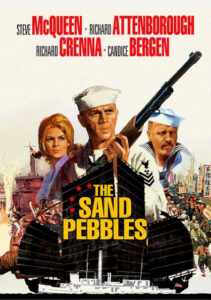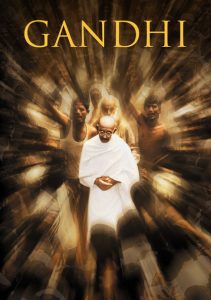The Sand Pebbles-1966
Director Robert Wise
Starring Steve McQueen, Candice Bergen, Richard Attenborough
Scott’s Review #1,257
Reviewed May 18, 2022
Grade: A-
The 1950s and 1960s can collectively be defined as the two decades representing the grandiose film epic, instantly recognizable cinematic sprawling, lengthy efforts, frequently encompassing a time.
The Sand Pebbles (1966) safely falls into this category, mainly because it’s a war film and one minute shy of a three-hour extravaganza.
The film was a critical and commercial success at its release and received several Academy Award nominations (see more below). Still, despite being a fantastic watch, it is not remembered as well as one might expect.
Something makes the film fly under the radar, and I’m unsure why. It might be that an anti-war message film was not as typical as it would become. In 1966, a United States movement had only begun to question the government and war in general.
It wasn’t fantastic or acceptable yet.
Robert Anderson adapted the screenplay from Richard McKenna’s 1962 novel, which is very similar.
Robert Wise, famous for directing the memorable The Sound of Music just one year prior in 1965 and the legendary West Side Story in 1961, is at the helm, resulting in superior direction, especially in the exterior and lush, oceanic sequences.
Star Steve McQueen was at the height of popularity when this film was made, which undoubtedly helped get butts in the seats to drool over the blue-eyed actor in his Navy attire.
The Sand Pebbles has a heavier touch and promotes an anti-war viewpoint from its main character. Therefore, it has a solid message that goes with the expected aspects of a war film.
It’s similar to The Bridge on the River Kwai (1957), made nearly a decade earlier.
The Asian locales and the parallels with the controversial Vietnam conflict of the time will not be lost on the viewer.
We go back to 1926 when the USS San Pablo was patrolling the Yangtze River during the clashes between Chiang Kai-shek’s communists and Chinese warlords.
Eight-year veteran machinist Jake Holman (McQueen), new to the self-named “sand pebbles” crew, immediately draws deep suspicion due to his independent streak.
Ordered to protect Americans, including schoolteacher Shirley Eckhart (Candice Bergen), Jake and the gunboat crew are unwittingly drawn into a bitter nationalistic feud that holds grim consequences.
Besides his unforgettable turn in The Getaway in 1972, the role is McQueen’s finest, and I’m not the biggest fan of his, nor do I feel he is the most outstanding actor.
He has tremendous material to work with in The Sand Pebbles and hits all cylinders throughout. The character is rootable and relatable to the audience.
The film also presents a fascinating look at Navy life with the camaraderie and depth of the supporting characters. There is comedy and drama, and the additions of Richard Attenborough and Richard Crenna are stellar.
Naturally, Bergen is McQueen’s romantic love interest, as Shirley and Jake have fledging feelings for each other.
Though the film ends abruptly, there is enough pain, death, and confusion to leave the viewer thinking afterward, and I always champion that aspect of the film.
The Sand Pebbles (1966) is an underrated production that simmers beneath some other classics from the same decade but is a terrific watch for many reasons. Despite being extremely timely, it has an old-world feel, representing a foray into the dangerous early 1970s cinema history that is yet to come.
Oscar Nominations: Best Picture, Best Actor-Steve McQueen, Best Supporting Actor-Mako, Best Art Direction-Color, Best Cinematography-Color, Best Film Editing, Best Original Music Score, Best Sound

